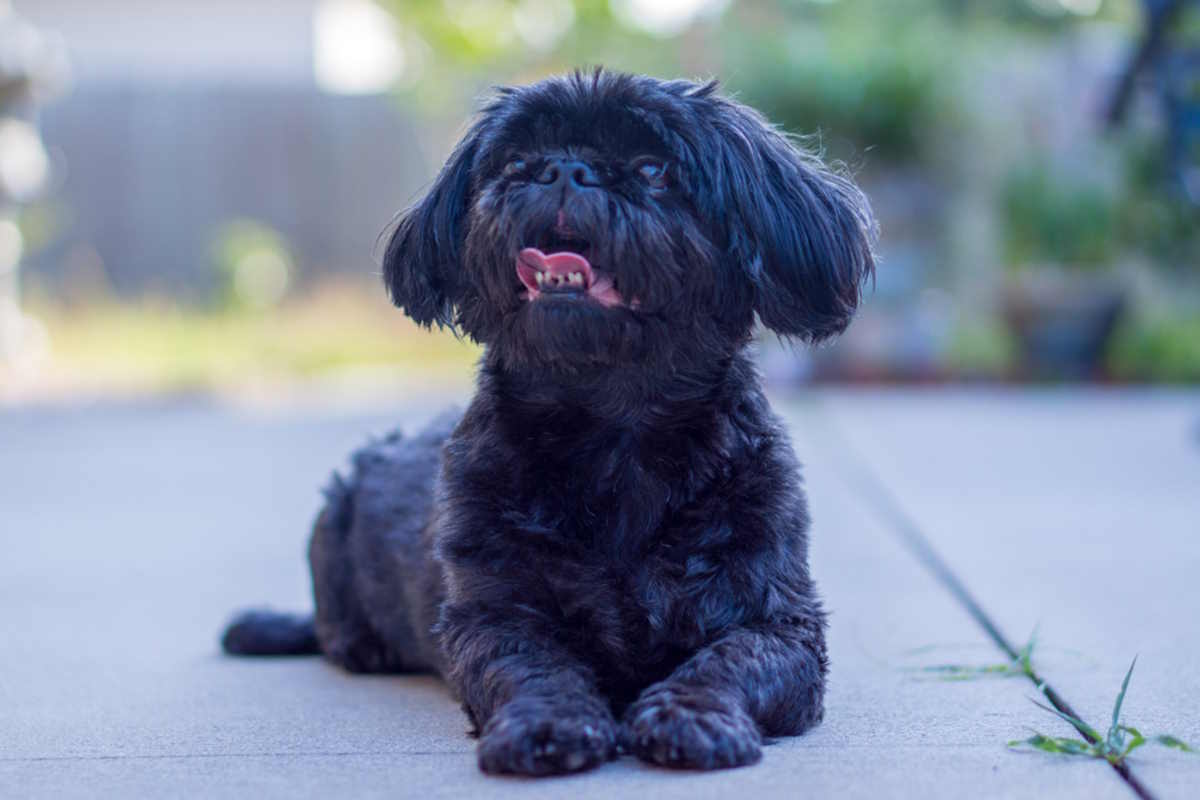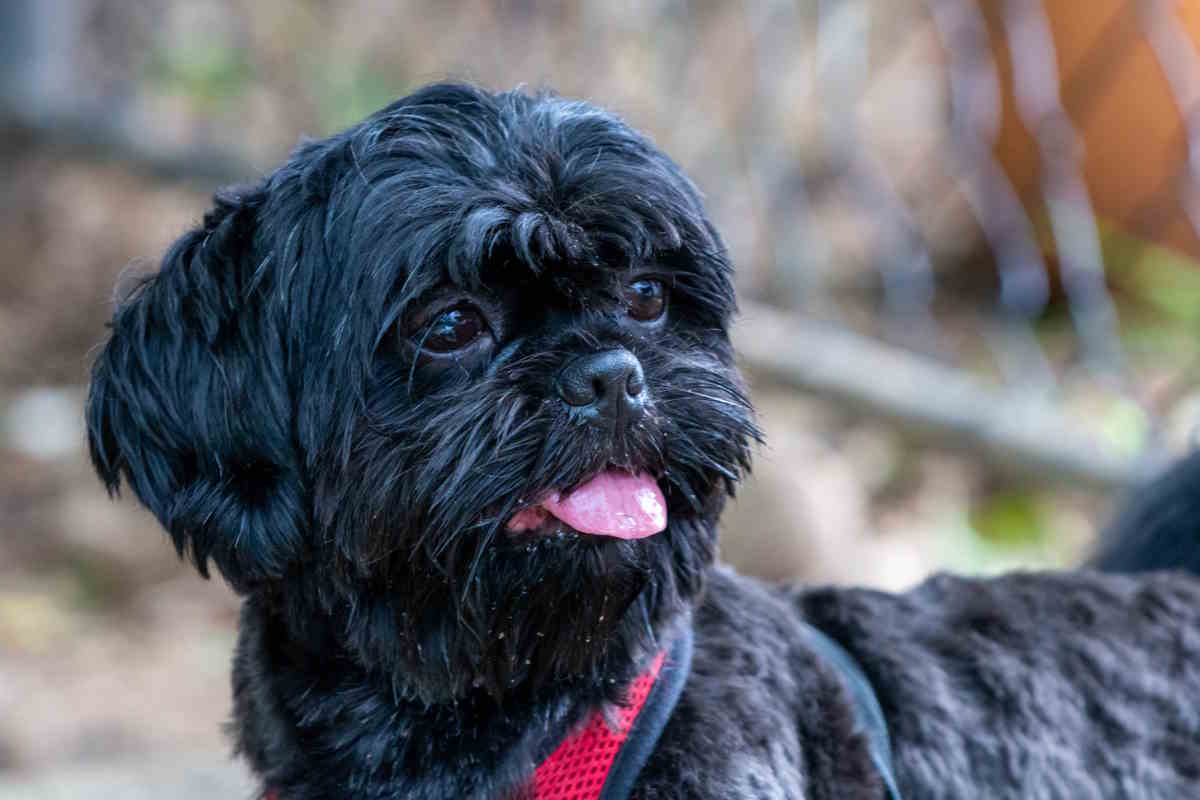- Home
- colors & markings
- black Shih Tzu dogs
A Rare and Captivating Sight: Uncovering the Mystery of Black Shih Tzu Dogs
By Everything Shih Tzu January 26, 2023
The Shih Tzu may be one of the most popular dogs to have, but even with its popularity among dog owners, there are some rare types of Shih Tzu.

While most will agree that a solid-colored Shih Tzu is the rarest among the breed, there seems to be an ongoing debate on which solid is harder to come by: black or white.
Nonetheless, the all-black Shih Tzu makes the list as one of the rarest coat colors to come by within the Shih Tzu breed.
The potential reasons for their rarity compared to other colors of the breed is quite interesting.
So, let's take a closer look into the captivating and elegant world of these ebony-colored canine companions!
What is a Black Shih Tzu?
The physical appearance of the black Shih Tzu can be described as a fully solid color coat.
They have the same physical characteristics as others within the breed, a jaw with a cute overbite, wide-eyed and friendly, and a little compact body.
In addition, the black Shih Tzu will have a long coat with soft-textured fur that is likened to silk.
Black Shih Tzus, like their counterparts, are also hypoallergenic, which is another reason for their popularity.
Who wouldn't love to have a dog you likely won't be allergic to.
You may have seen a black Shih Tzu before; however, it may not have a completely black coat.
Why Solid Black Shih Tzu Are So Rare
Solid black Shih Tzu dogs, like the Liver and Blue Shih Tzu, are considered rare compared to other coat colors of this breed.
It may surprise you to learn that a black Shih Tzu are uncommon, considering dogs with black coats in general are very common.
Still, it is actually extremely unusual to have a litter of these solid black pups.
While the American Kennel Club recognizes solid black as a standard color among the Shih Tzu, finding an entirely black one is pretty rare.
Solid black Shih Tzus are indeed rare, as are any solid color would be for this breed. In contrast, it is more common for a Shih Tzu to have a multi-color coat with numerous color combinations.
Seeing a black Shih Tzu isn't necessarily uncommon, but most black Shih Tzus will have at least a stripe or patch of white or another color on their coat.
For a Shih Tzu to be considered solid black and be able to register with the American Kennel Club, they cannot have any other color presented on them.
This means the nose, paws, and the rims around their eyes have to be black in color as well.
Another reason these specific Shih Tzu's are hard to come by is that most Shih Tzu's have a colored pattern gene somewhere in the familial line.
We may have all learned about recessive and dominant genes in school, but to put it simply, the more the colored pattern gene is present in a line, the least likely the litter will come out with any solid colors.
Does a Black Shih Tzu Stay Black?
Nope! That's one of the remarkable things about this breed. They have the potential to develop into a new dog in appearance over time with the changing of their fur.
A fascinating phenomenon that occurs within the Shih Tzu is that their coats have the ability to change colors.
If you are someone who specifically wants to have a black Shih Tzu, it's important to know that when it comes to this breed, color isn't necessarily something you want to look at when choosing to bring a puppy into your family.
Many Shih Tzu puppies will change color within their first birthday.
Others can slowly change as they age or do a complete 180 whenever they reach their senior years. Many can even develop spots or stripes of different colors in certain areas of their small frames.
According to Pedigree, two particular genes are responsible for why your black furry friend may not always stay that way: the G gene and the CH gene. The G gene is also known as "fading.'
This fading occurs within the first year of life and can cause the dark pigment in their coat to fade, creating a duller-toned black or even a different color altogether.
The CH gene, or the chinchilla gene, can cause their black coat to turn into a silver color.
The other way your black Shih Tzu can change color is by simply aging.
When a dog ages, melanin, a pigment that determines the color, stops being produced. This is why you can often distinguish younger dogs from senior dogs by their coat color.
The coat will turn gray or even white, usually noticeable around the muzzle and eyebrow area.
Besides the natural aging process, stress has been linked with the change in the color of their coats.
A 2016 study examining 400 young dogs between the ages of 1 and 4 showed that the younger dogs were more likely to develop graying around their muzzle when stressed.
While the Shih Tzu is known for their happy and joyful demeanor, this breed can also become stressed out, potentially changing its shiny black fur.
Eye Color in Black Shih Tzu

The most common eye color among all Shih Tzu is brown, but if they are of a liver or blue variety, they may have different colored eyes, such as blue or green.
The black Shih Tzu will most always have dark-colored eyes.
Still, it's not impossible for them to have brown eyes that may come across as black or heterochromia.
Heterochromia among the Shih Tzu is more prevalent than in other breeds. Shih Tzu may develop heterochromia, which basically means having two different eye colors.
It is rare for them to have complete heterochromia (one full eye, another color). Instead, they are more likely to experience sectoral or central heterochromia.
- Sectoral heterochromia: When only part of the eye is a different color.
- Central heterochromia: When only the area around the iris is a different color.
There are certain things you may want to watch for with your black Shih Tzu when it comes to their eye color.
The Shih Tzu can develop cataracts.
If you notice your Shih Tzu's eye color is changing to a blueish-white color, be on the safe side and consult your veterinarian for further treatment.
Cataracts are an inherited gene among Shih Tzu. These can appear as a cloudy film over the eye that causes extreme discomfort and can result in your dog going blind.
While it may be expected for your black Shih Tzu to change coat colors, the same does not go with their eyes and can be a sign of a significant health concern.
For such a little dog, it sure is complex.
When it comes to the black Shih Tzu, there is more than meets the eye.
While it can stay a true black, this long coat beauty can also transition from a darker black to a lighter one. It can also develop patches and streaks as well.
For it to be considered a black Shih Tzu, it must have black all over its body.
The Shih Tzu is an extraordinary dog, and the appearance of a solid black one only adds to the uniqueness of this breed.
Its ability to defy genetic lineage and its silky dark fur make this dog a one-of-a-kind among its pedigree.
Regardless of if it stays the same color for the entirety of its life, if you do get the chance to have this pup, you'll be glad to have owned one of the cutest dogs around.
- Home
- colors & markings
- black Shih Tzu dogs



